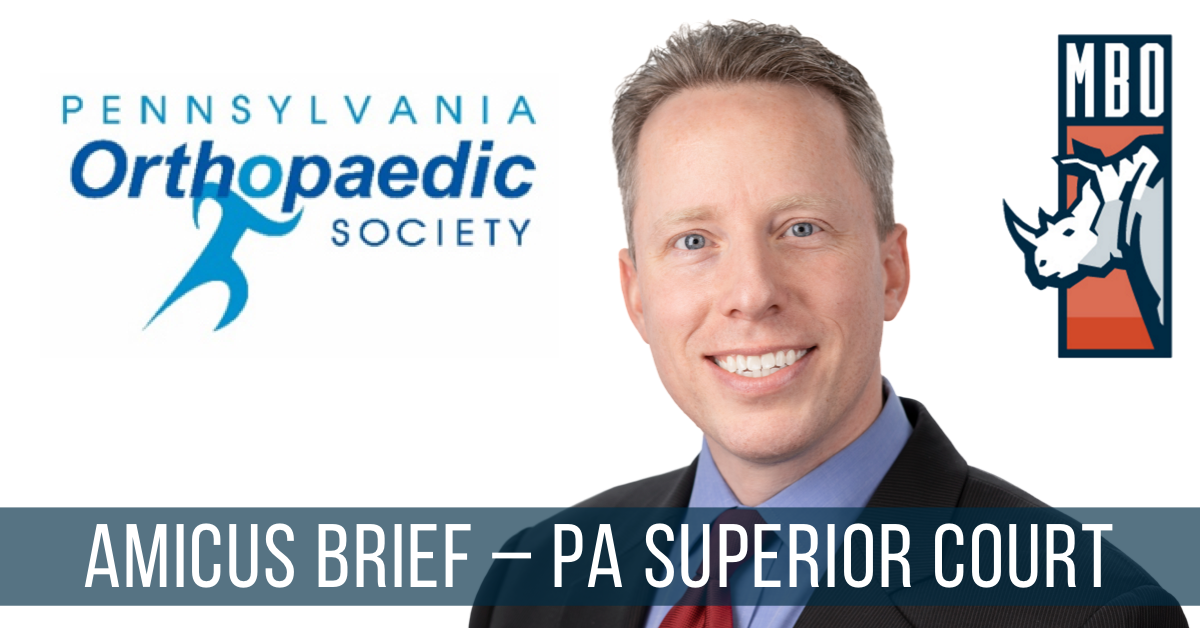Matis Baum O’Connor Defends Venue Protections for Pennsylvania’s Healthcare Providers in Superior Court Appeal

July 10, 2020
Pittsburgh, PA
Pennsylvania healthcare providers, take note: there is a war raging on multiple fronts to repeal, overturn, and invalidate virtually every tort reform that was enacted in Pennsylvania following the medical malpractice crisis of the early 2000s. The latest battle is an appeal before the Superior Court of Pennsylvania that seeks to strike down all “venue” protections for healthcare providers, thereby making it easier to sue doctors in mega-verdict jurisdictions like Philadelphia.
The Pennsylvania Orthopaedic Society retained Matis Baum O’Connor shareholder Michael K. Feeney, Esq., to represent it as Amicus Curiae in the appeal. The resulting Amicus Brief, filed with the Superior Court of Pennsylvania yesterday, may be viewed here.
The appeal challenges the constitutionality of 42 Pa.C.S. § 5101.1, the state law that requires medical professional liability cases to be filed in the county in which the alleged malpractice occurred. It also attacks Pennsylavnia Rule of Civil Procedure 1006(a.1), which requires the same. As the Amicus Brief argues, the Pennsylvania Legislature had clear authority to enact Section 5101.1 under the Pennsylvania Constitution and pursuant to the sound public policy considerations that buttress Pennsylvania’s Medical Care Availability and Reduction of Error Act. Rule 1006(a.1) similarly passes constitutional muster, as it sensibly protects against both improper “forum shopping” and overloading of the Commonwealth’s larger judicial districts.
Other recent attacks on legal protections for Pennsylvania’s healthcare providers include:
• In October 2019, the Supreme Court of Pennsylvania struck down the MCARE Act’s seven-year statute of repose. This opens the door for plaintiffs to sue their doctors even years after the patient’s medical records have been destroyed.
• In December 2018, the Supreme Court of Pennsylvania, through its Civil Procedural Rules Committee, proposed to simply abolish the venue protections of Rule 1006(a.1) outright.
• In March 2018 and in April 2019, the Supreme and Superior Courts of Pennsylvania issued a pair of decisions that significantly erode the peer-review privilege.
• In June 2017, the Supreme Court of Pennsylvania ruled that surgeons do not have the discretion to delegate their duty to obtain patients’ informed consent.
At a time when healthcare providers are literally risking their lives for patients in the midst of a global pandemic, they are getting no thanks in Pennsylvania’s appellate courts. The attorneys of Matis Baum O’Connor are dedicated to the defense of Pennsylvania’s healthcare professionals with razor-sharp trial preparation, innovative strategies, sophisticated advocacy, and mastery of the courtroom.
Attorney Feeney, a shareholder at Matis Baum O’Connor, dedicates his practice exclusively to the defense of healthcare providers and is an experienced amicus practitioner. His bio may be viewed here.
The Pennsylvania Orthopaedic Society was a leading advocate for medical malpractice reforms in 2002 and 2003. It is a non-profit organization, founded in 1956, that represents over 1,200 orthopaedic surgeons, residents, and fellows practicing throughout the Commonwealth of Pennsylvania. The organization’s Mission is “to enhance our members’ ability to provide the highest quality musculoskeletal care.” Its Vision is to “be the primary organization that promotes quality musculoskeletal health for the citizens of Pennsylvania.”

